May 21, 2006
Matrix Reloaded
Movie Review By: SFAM
Year: 2003
Directed by: Andy & Larry Wachowski
Written by: Andy & Larry Wachowski
Degree of Cyberpunk Visuals: Very High
Correlation to Cyberpunk Themes: High
Key Cast Members:
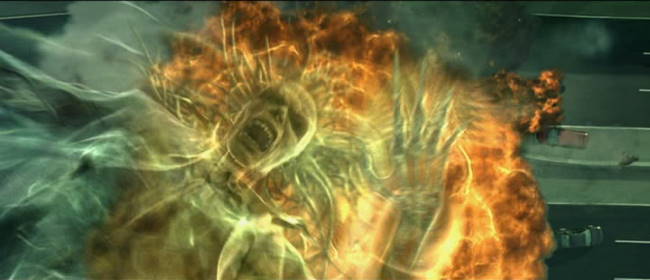
Overview: Matrix Reloaded, one of the most anticipated movies of 2003 provides a very interesting follow-up to one of the best, most influential movies in cyberpunk and all of Sci-Fi. Many have knocked this (and Revolutions more) for being a significant step down from the original movie, and to an extent they are in that the “newness” of the idea has worn off. But truly, it would be absurd to expect the Wachowskis to not use the universe they have already painstakingly created. In this sense, the sequels HAVE to provide a different sensation. In this sense, Reloaded does not disappoint. We get great performances by the Matrix leads, along with a number of truly terrific supporting roles. For this review, I’ll try to concentrate my comments more on the Sci-Fi aspects of the movies versus the religious narrative, as this also covered wonderfully elsewhere. I’ve also tried to use less well known screencaps on the first page of this review. To see some of the more popular Reloaded screencaps, go to page 2 of this review. Also, this review goes in line with my more in-depth assessment of the trilogy from a SciFi perspective:
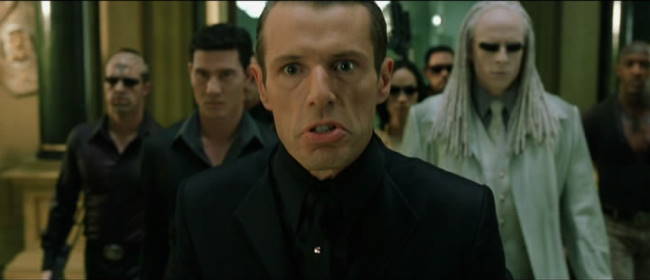
No “The Matrix Sucks/No It’s Great - You Just Don’t Understand!” Debates: Just a fair warning – if youre expecting Matrix sequel bashing, I’m afraid you’ve come to the wrong site. There are numerous places to read such banter if you’re interested. I absolutely love the sequels for a variety of reasons (some of which I explain below), but I really don’t mind in the least if you hate the sequels. Yet, for this movie, I’d really like the comments on this entry to be more related to the movie itself versus whether or not you hate the sequels. Believe me when I tell you I’ve participated in many more hours of discussion on this topic than I ever care to, and absolutely will not get into this in the comments section of this review. If you MUST engage in the “Matrix Sequels Suck/No - They’re Great, You Just Don’t Understand!” debate, please use this thread in the Meatspace.
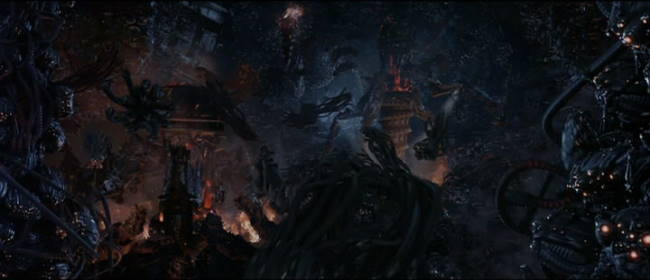
The Story: I’m going to go out on a limb here and guess that about 99.9% of you reading this review have already seen Reloaded, so I won’t spend much time on an overview of the story unless its specifically requested. In brief, Matrix Reloaded is the sequel to the Matrix, and is the second of three movies in the trilogy. In Reloaded, six months have past since the end of the Matrix, during which time, Morpheus, Neo and Trinity have been busting hump freeing massive numbers of battery people. In Reloaded, we get to see Zion, a return of Mr. Smith, and eventually, a fuller understanding of the nature of the Matrix and the Prophecy of the One.
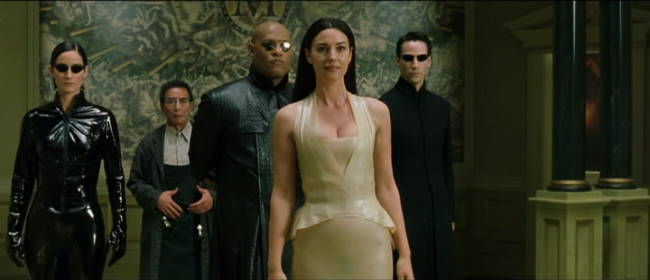
The Supporting Characters: One of the real strong points of Reloaded is the cool character additions. The best ones are of course the Merovingian (played magnificently by Lambert Wilson) and Persephone, played by the ultra-sexy Monica Bellucci in a totally hot see-through dress. When they are onscreen, both absolutely steal the scenes. Almost as terrific is the Architect (Helmut Bakaitis) and the blasé evil ghost twins (Adrian and Neil Rayment – who actually are twins) – they have to be up there as some of the best henchmen ever to grace the screen. Seraph (Collin Chou), Councilor Hamann (Anthony Zerbe), Link (Harold Perrineau), the Keymaker (Randall Duk Kim), and Niobe (Jada Pinkett Smith) all really add to the movie as well.
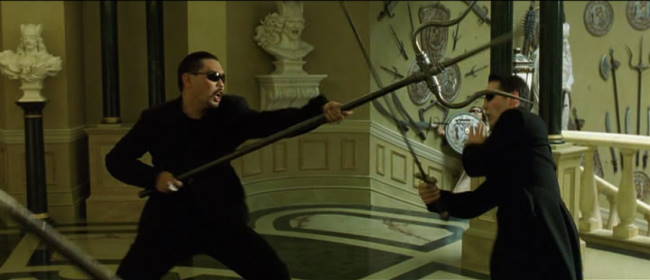
The Action: Reloaded is filled to the brim with awesome action scenes. In addition to some wonderful Woo-ping Yuen choreographed fights, we get one of the best highway chase scenes ever put on film. The Trinity motorcycle part in particular is just awesome. Truly though, serious credit has to go here to Keanu Reeves’ preparation and training for this film. By all accounts he was an absolute machine in terms of preparation. It really shows on screen. His wire work and martial arts scenes are just terrific (And no, I’m not comparing him to those in Hong Kong who’ve spent an entire career doing this stuff). The CG for the most part is absolutely top notch.
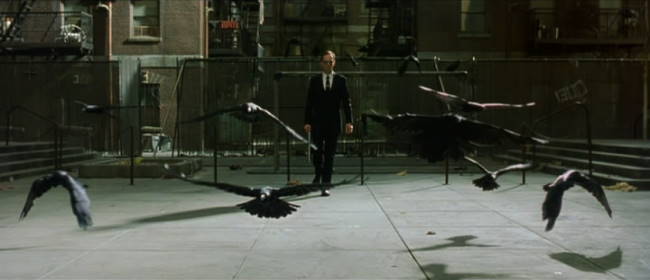
The Visuals: Matrix Reloaded has a lot more diversity in its visuals than the Matrix provided us. We have a few experimental shots like the graphic novel scene of Neo flying with the Moon behind him – and lots of yellows and greens. For yellows, we get rave scenes, explosions, and fights in a yellow weapons room. Greens, of course, still dominate the majority of the scenes – like the first movie, they are omnipresent in most low-light scenes. All in all, the visuals are incredibly diverse and interesting.
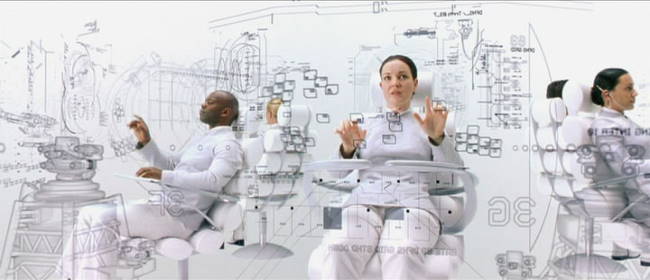
The Pacing: Matrix Reloaded starts off with a bang (literally) before getting into the story. We get a mixture of plot discussions, action sequences and philosophical breaks. But Reloaded is as a whole is definitely of a different style pacing than most movies. It and its sequel more closely resemble the approach taken in Oshii’s Ghost in the Shell, where there are philosophical and thematic discussions that are then played out in the action sequences. The ending clearly comes off as a cliff-hanger, which is to be expected considering this is the middle of a trilogy.
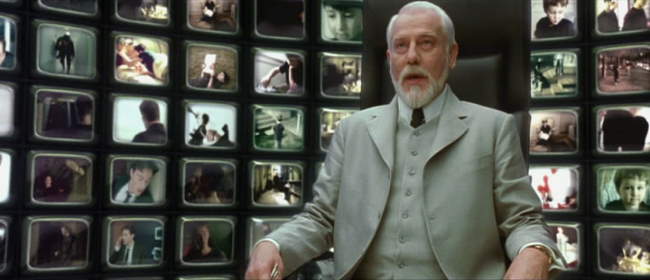
The Architect Conversation: The Architect conversation provides some of the best dialogue of the entire trilogy. This is a philosophical break, a plot buster, and more importantly, the major turning point in the trilogy. The Architect and his minions serve as the ultimate representation of a negative feedback (negating change from an initial goal state) control system. His whole purpose in life is to ensure a steady supply of power (electricity) to the Machine City. As the power is created off the electricity in humans, the Architect must develop a plato cave-like virtual reality simulation that provides humans with a believable reality. The Architect reveals the details of the control system that has kept the machines satiated with electricity for the past 600+ years. In this we find that the prophecy of the One is merely one more layer of control to maintain the status quo to handle the problems arising from freewill (more on this below). Unfortunately, something (or someone) has thrown a monkey wrench into his carefully laid plans. Neo has fallen in love, and in so doing, creates a personal connection with a human that is potentially larger than his overall connection with humanity.
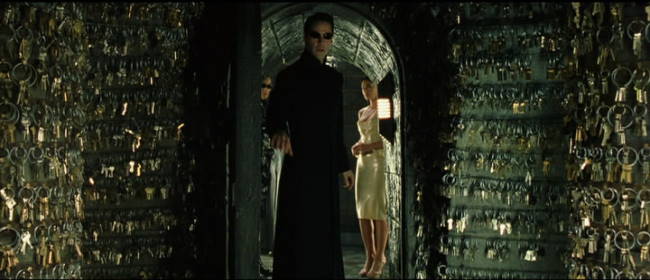
Freewill: Matrix Reloaded spends a good bit of the philosophical breaks discussing the impact of freewill on actions, decision making and on control systems. The Merovingian assets that without the “why,” freewill is merely a facade by those in power that is placed on the powerless. The architect who created the Matrix based on mathematical equations. While he has accounted for almost all anomalies, he had to develop a special periodic subroutine to address the issue of freewill. Because a very small subset of the population would reject the Matrix programming, there needed to be a way of handling this. His approach involves the creation of an external holding bin called “Zion,” which which he would let fill up with the problem battery people, and then every hundred years or so would clean out the holding bin and start again. Simultaneasly, Morpheus, who is unaware of this freewill control subroutine, sees the prophecy of the One as a deterministic journey - one which both reduces the power of freewill while supposedly saving Zion.
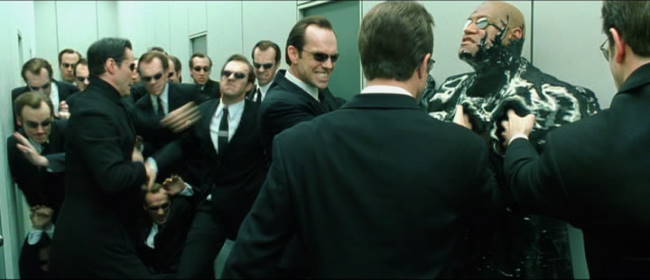
Positive Feedback Out of Control: From a cybernetic standpoint, Positive feedback, or the deviation from an initial goal state, plays a huge role in both reloaded and revolutions. In fact, both movies constitute an emergence and interplay among dueling feedback systems. The architect has created a negative feedback system that has been in force for at least 600 years. Yet now, the perturbations to the negative feedback control system are systemic – in fact, they constitute an initial kick in an entirely new direction. The study of cybernetics tells us that negative feedback systems are destroyed – often never to be repaired to their original state – if the upper or lower threshold values in the are exceeded. For instance, if the body temperature in a human exceeds 106 degrees Fahrenheit, the human will die. In the futuristic dystopia of the Matrix, this is the strategy the Oracle takes. The rationale is that unless the architect’s control system is rendered moot, the “ebony and ivory, living in perfect harmony” future (with machines and humans) the Oracle desires cannot occur.
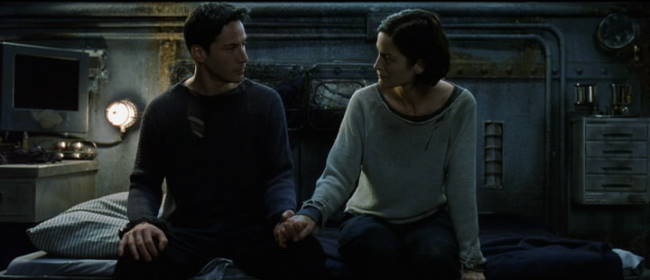
Elements of the positive feedback system, represented in totally by the Oracle and the causality she creates, include both a modification of Neo’s operant conditions and an intrusion into Mr. Smith’s deletion. Neo’s love for Trinity changes the outcome of the Architect’s freewill subroutine – instead of having only one real choice (saving humanity), Neo has a new choice – save trinity now and spend 24 hours trying to rescue Zion and humanity or continue with the control system which will wipe out Zion. Additionally, Mr. Smith has been transformed into a virus. When Neo destroys him in the first movie, Mr. Smith did not disappear – instead (as we find out in Revolutions), the Oracle intervenes and creates the new, viral Smith. While there is no resolution to this in reloaded, the context is set for the resolution in Revolutions.
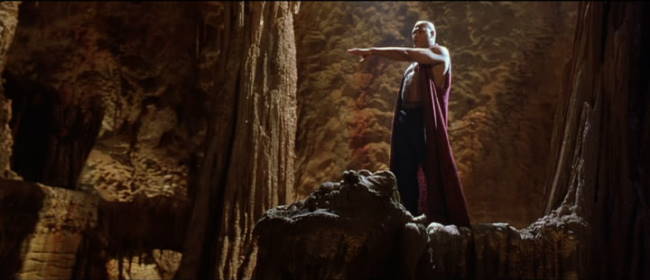
I Believe…: I believe this phrase (“I believe”) is used twenty times or more in Reloaded. There are times it fits perfectly, whereas others it seems to interfere with the dialogue. The scene where Commander Lock is discussing strategy with the Council is the most egregious example of this. Versus “I believe we need every ship…” it would have been far more realistic had he used a simple “We need every ship if we are even to have a chance…” The problem of course is the whole issue of whether or not the Commander and Council believe in the Prophecy of the One. As impending doom draws nearer, the tendency to place faith in supernatural explanations for salvation becomes too great to resist.
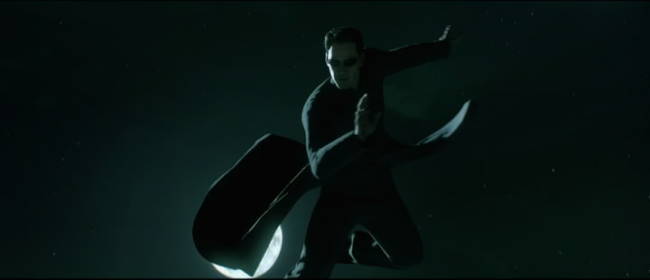
The Bottom Line: The Matrix Reloaded is a terrific follow-up to one of the most influential movies ever. The Wachowski brothers have provided a movie where the action is terrific, the characters are memorable, and the narrative is complex and interesting. Lawrence Fishbourne as Morpheus in particular shines here, which is great, in that is role is significantly diminished in Revolutions. While Reloaded suffers somewhat from being the middle movie in a trilogy, I think it handles this well. The ending provides us with a cliffhanger, which, at the time of release, sparked IMENSE numbers of interesting theories and ideas. I’m guessing most of you have watched Reloaded, so I feel strange giving a plug to watch it. All I can say is I love it.





Comments
May 21, 2006
iammany said:
Under “Freewill” the last sentence is “His approach involves the creation of an external holding bin called “Zion,” which”… unfinished.
ETM said:
I’m staying out of this one. Any mention of Reloaded leaves a bad taste in my mouth… as much as I can truly recognise the good and great things in it, it was still a huge letdown for me.
SFAM said:
Hi Iammany, thanks for the catch. The Freewill section is filled in now.
July 22, 2006
spikethebloody said:
As the DVD Box Set mentions it seems that Free Will is the philosophical problem of Reloaded. It is interesting that the first film really deals with the nature of reality. We were kind of given a crash course in what is real and true and how we can know the truth. The second film deals with the next step which is as a true cognizant self aware being are you able to effect change on the nature of reality you perceive? The third film comes along then and says really what you should do with the opportunity you have.
I don’t think Neo has free will part one or two. Or at least up until the latter stages of the discussion with The Architect. In a sense the old “matrix within a matrix” theory is correct. If you broaden your definition of the matrix to Morpheus’ definition in the first film. He describes The Matrix as a “prison for your mind”. In that sense Neo breaks free from his second matrix at the tail end of Reloaded. The free will subroute as you call it is the second prison for his mind that has him doing exactly what the negative feedback system wants him to do. I think until he takes the wrong door and goes back for Trinity, Neo is as powerless and imprisoned as The Merovingian had declared him to be.
Then the third film deals with what you do with knowledge of reality and recognition that you actually can change said reality.
July 24, 2006
SFAM said:
Hi Spike, I agree that Neo first shows freewill at the end of Reloaded. Prior to this, he may think he had freewill, but even if he did so, it was still within the confines of predictability.
September 30, 2006
Guardian Zero said:
The first part was so good, that you needed a second part.
The sex scene was unnecesary to the story. Anybody could see the romantic atmosphere between them.
I liked the idea of balance between Smith and Neo, and between Oracle and Architect. I think the second part tried to balance all the situations presented in the three movies. Balance is the key word.
You couldn’t rate this movie alone. The three movies deserved ten stars.
October 4, 2006
mattness said:
August 28, 2007
monicabellucciisfine said:
How HOT is monica bellucci? i mean DAUUUUM!
just for her, this movie gets 5 stars.
-DAUUUM shes fione
September 13, 2009
chlordane said:
I found the rave scene to be revealing, showing how all races are kind of blended into a “brown” race, instead of just black/white/yellow and so on.
I found interesting because I am black, and married to a white woman, its beautiful scene.
September 9, 2011
Hellscion said:
the matrix 2, keanu reeves saves the world.. again